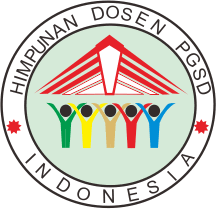Pengaruh kesadaran metakognisi terhadap kemampuan berpikir kritis mahasiswa PGSD UNS Surakarta
Abstract
Keywords
Full Text:
PDFReferences
N. Nuraini, “Profil keterampilan berpikir kritis mahasiswa calon guru biologi sebagai upaya mempersiapkan generasi abad 21,” J. Pendidik. Biol., vol. 1, no. 2, pp. 89–96, 2017, [Online]. Available: https://jurnal.um-palembang.ac.id/dikbio/article/view/676 [2] M. Haviz, H. Karomah, R. Delfita, M. I. A. Umar, and I. M. Maris, “Revisiting generic science skills as 21st century skills on biology learning,” J. Pendidik. IPA Indones., vol. 7, no. 3, pp. 355–363, 2018, doi: 10.15294/jpii.v7i3.12438. [3] M. Munawwarah, N. Laili, and M. Tohir, “Keterampilan Berpikir Kritis Mahasiswa Dalam Memecahkan Masalah Matematika Berdasarkan Keterampilan Abad 21,” Alifmatika J. Pendidik. dan Pembelajaran Mat., vol. 2, no. 1, pp. 37–58, 2020, doi: 10.35316/alifmatika.2020.v2i1.37-58. [4] OECD, “PISA,” vol. 24, no. 1, pp. 12–17, 2018. [5] Z. Abidin and M. Tohir, “Keterampilan Berpikir Tingkat Tinggi Dalam Memecahkan Deret Aritmatika Dua Dimensi Berdasarkan Taksonomi Bloom,” Alifmatika J. Pendidik. dan Pembelajaran Mat., vol. 1, no. 1, pp. 44–60, 2019, doi: 10.35316/alifmatika.2019.v1i1.44-60. [6] D. Wahidin and L. A. M. Romli, “Students critical thinking development in the national sciences and mathematics competition in Indonesia: A descriptive study,” J. Pendidik. IPA Indones., vol. 9, no. 1, pp. 106–115, 2020, doi: 10.15294/jpii.v9i1.22240. [7] D. S. F. Arif, Zaenuri, and A. N. Cahyono, “Analisis Kemampuan Berpikir Kritis Matematis Pada Model Problem Based Learning ( PBL ) Berbantu Media Pembelajaran Interaktif dan Google Classroom,” Pros. Semin. Nas. Pascasarj. UNNES, no. 2018, pp. 323–328, 2019. [8] I. Anugraheni, “Analisis Kesulitan Mahasiswa dalam Menumbuhkan Berpikir Kritis Melalui Pemecahan Masalah,” J. Cendekia J. Pendidik. Mat., vol. 4, no. 1, pp. 261–267, 2020, doi: 10.31004/cendekia.v4i1.197. [9] M. Maulana, Konsep dasar matematika dan pengembangan kemampuan berpikir kritis-kreati. UPI Sumedang Press, 2017. [10] I. Budi M and A. Ghofar CW, “Analisis Keterampilan Berpikir Kritis Dan Metakognitif Mahasiswa Program Studi Pendidikan Biologi,” Bioma J. Ilm. Biol., vol. 6, no. 1, 2017, doi: 10.26877/bioma.v6i1.1472. [11] S. Kassiavera, A. Suparmi, C. Cari, and S. Sukarmin, “Survei Keterampilan Berpikir Kritis Mahasiswa pada Materi Usaha dan Energi,” Pros. SNFA (Seminar Nas. Fis. dan Apl., vol. 4, p. 162, 2019, doi: 10.20961/prosidingsnfa.v4i0.35928. [12] A. Kamaliyah, L. K. Muharrami, M. Yasir, and W. P. Hadi, “Analisis Kemampuan Metakognisi Siswa SMP pada Materi Pemanasan Global,” Nat. Sci. Educ. Res., vol. 4, no. 3, pp. 258–266, 2022, doi: 10.21107/nser.v4i3.9064. [13] R. Rasmawan, “Profil Keterampilan Berpikir Kritis Mahasiswa dan Korelasinya dengan Indeks Prestasi Akademik,” EduChemia (Jurnal Kim. dan Pendidikan), vol. 2, no. 2, p. 130, 2017, doi: 10.30870/educhemia.v2i2.1101. [14] N. F. Wahdah, A. W. Jufri, and L. Zulkifli, “Jurnal Belajar Sebagai Sarana Pengembangan Kemampuan Metakognisi Siswa,” J. Pijar MIPA, vol. 9, no. 2, pp. 70–74, 2016. [15] J. a Livingston, “Metacognition: an overview,” Psychology, vol. 13, pp. 259–266, 1997, [Online]. Available: http://gse.buffalo.edu/fas/shuell/CEP564/Metacog.htm [16] Ildayanti, “Hubungan Kemampuan Berpikir Kritis dan Kesadaran Metakognitif dengan Hasil Belajar Biologi Siswa Kelas XI IPA SMA Negeri Di Kabupaten Pinrang,” 2017. [17] D. Aji Pangestuti, R. T. Rita Marpaung, and N. Hasnunidah, “Pengaruh Discovery Learning terhadap Kesadaran Metakognisi dan Hasil Belajar Peserta Didik (The Effect of Discovery Learning toward Student’s Metacognitive Awareness and Cognitive Learning Achievement),” vol. 7260, no. 2, pp. 52–57, 2019, [Online]. Available: http://ejournal.upi.edu/index.php/asimilasi [18] M. Ikhsan, S. Munzir, and L. Fitria, “Kemampuan Berpikir Kritis dan Metakognisi Siswa dalam Menyelesaikan Masalah Matematika melalui Pendekatan Problem Solving,” AKSIOMA J. Progr. Stud. Pendidik. Mat., vol. 6, no. 2, p. 234, 2017, doi: 10.24127/ajpm.v6i2.991. [19] D. E. A. Diella, “Hubungan kemampuan metakognisi dengan keterampilan berpikir kritis dan sikap ilmiah siswa kelas xi pada materi sistem ekskresi manusia,” 2014. [20] S. M. P. Lestari, “Perbedaan Tingkat Refleksi Diri dalam Pembelajaran Mahasiswa Fakultas Kedokteran Universitas Malahayati Tahun 2019,” J. Malahayati, vol. 6, pp. 257–263, 2019. [21] B. Sadeghi, M. T. Hassani, and M. Rahmatkhah, “The relationship between efl learners‟ metacognitive strategies, and their critical thinking,” J. Lang. Teach. Res., vol. 5, no. 5, pp. 1167–1175, 2014, doi: 10.4304/jltr.5.5.1167-1175. [22] H. Hasanuddin, K. Khairil, S. Samingan, I. Huda, and A. Agustina, “Pengaruh Strategi Metakognitif Terhadap Kemampuan Berpikir Kritis Dan Hasil Belajar Peserta Didik Pada Materi Sistem Pencernaan Di Sman Banda Aceh,” Biot. J. Ilm. Biol. Teknol. dan Kependidikan, vol. 8, no. 1, p. 60, 2020, doi: 10.22373/biotik.v8i1.6759. [23] W. Saputri and A. D. Corebima, “The Correlation between Metacognitive Skills and Cognitive Learning Results of Biology Pre-service Teachers on Different Learnings,” J. Turkish Sci. Educ., vol. 17, no. 4, pp. 487–503, 2020, doi: 10.36681/tused.2020.40. [24] D. Agustin, H. Widowati, and Achyani, “Hubungan Kesadaran dan Regulasi Metakognitif Terhadap Kemampuan Berpikir Kritis Mahasiswa Pendidikan Biologi,” Semnasdik Fkip Univ. Muhammadiyah Metro, pp. 19–24, 2017, [Online]. Available: http://repository.ummetro.ac.id/files/semnasdik/4712feef216134e9f0830f475d9acea6.pdf [25] Sugiyono, Metode Penelitian Kuantitatif, Kualitatif, dan R&D. 2017. [26] R. S. Schraw, G. & Dennison, “Metacognitive Awareness Inventory (MAI). What is Metacognition?,” Contemp. Educ. Psychol., no. 19, pp. 460–475, 1994, [Online]. Available: https://www.rcsj.edu/Tutoring-site/Gloucester-site/Documents/Metacognitive Awareness Inventory.pdf [27] Budiyono, Pengantar Penilaian Hasil Belajar, 1st ed. Indonesia: UPT Penerbitan dan Percetakan UNS (UNS Press), 2015. [28] J. Pimvichai, S. Sanium, and K. Buaraphan, “Exploration of Students’ Metacognitive Experience in Physics Classroom,” J. Phys. Conf. Ser., vol. 1340, no. 1, 2019, doi: 10.1088/1742-6596/1340/1/012076. [29] A. M. Amin, A. D. Corebima, S. Zubaidah, and S. Mahanal, “The correlation between metacognitive skills and critical thinking skills at the implementation of four different learning strategies in animal physiology lectures,” Eur. J. Educ. Res., vol. 9, no. 1, pp. 143–163, 2020, doi: 10.12973/eu-jer.9.1.143. [30] L. Naimnule and A. Duran Corebima, “The Correlation between Metacognitive Skills and Critical Thinking Skills toward Students’ Process Skills in Biology Learning,” J. Pedagog. Res., vol. 2, no. 2, pp. 122–134, 2018, [Online]. Available: www.ijopr.com [31] U. Albab, Budiyono, and D. Indriati, “Metacognition skills and higher order thinking skills (HOTS) in mathematics,” J. Phys. Conf. Ser., vol. 1613, no. 1, 2020, doi: 10.1088/1742-6596/1613/1/012017. [32] S. Arslan, “Investigating Predictive role of Critical Thinking on Metacognition with Structural Equation Modeling,” Malaysian Online J. Educ. Sci., vol. 3, no. 2, pp. 1–10, 2015. [33] Sodikin, “Peningkatan Hasil Belajar Siswa dengan Metode Diskusi Kelompok dalam Pembelajaran Ipa Sekolah Dasar,” UIN Maulana Malik Ibrahim, vol. 39, no. 1, pp. 1–15, 2014, [Online]. Available: http://dx.doi.org/10.1016/j.biochi.2015.03.025%0Ahttp://dx.doi.org/10.1038/nature10402%0Ahttp://dx.doi.org/10.1038/nature21059%0Ahttp://journal.stainkudus.ac.id/index.php/equilibrium/article/view/1268/1127%0Ahttp://dx.doi.org/10.1038/nrmicro2577%0Ahttp://
Refbacks
- There are currently no refbacks.



